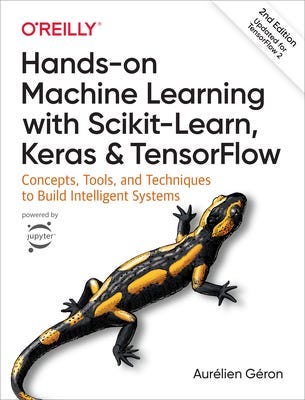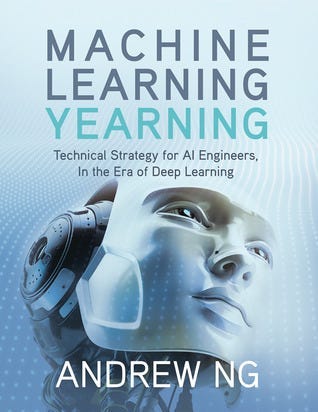6 Data Science Books That Transformed My Career (And Will Change Yours Too)
Stop overthinking your learning path — these are the books that actually matter.

“There are plenty of resources, and I’m confused if I’m on the right path. Could you please help me out?”
Sound familiar?
I hear this from aspiring data scientists all the time.
And honestly, I get it.
When I started learning data science, “deep learning” was the buzzword. Now it’s Generative AI. LLMs. AI Agents. The landscape keeps shifting, but here’s what hasn’t changed — the overwhelming flood of information that leaves beginners paralyzed.
I see similar trends all the time in the fields of AI and data science. Topics change, but the rapid progress is a constant.
What good can 52-week roadmaps, 25 resource sheets, and endless course catalogs do if you’re overwhelmed, end up overthinking, and take no action at all?
That’s why I’m simplifying things for you.
I’ve selected six books that’ve genuinely shaped my career, from my early, clueless days to leading machine learning teams. These aren’t just “nice to have” resources; they’re the ones I actually used, reread, and recommend to my friends.
Let’s dive in, shall we?
1. Data Science From Scratch by Joel Grus (Beginner)

I’m so glad I found this book in my early days. I don’t think anyone else will walk you through all the fundamental steps in data science in the simplest possible way like Joel does.
The best part? You don’t need any prerequisites to get started.
You’re put into the most realistic data scientist’s role.
Joel takes an interesting approach, where you’re hired as the lead data scientist at a hypothetical social network called DataSciencester. And throughout the book, he’ll help you solve all the problems you’d encounter at work. I loved this unconventional approach. What can I say?
I couldn’t find an important topic that was missing.
The book has all the concepts you need as a data scientist, from programming to statistics to probability to Big Data, with code examples. The table of contents took me by surprise — I couldn’t find any important topic that was missing. It covers linear algebra, statistics, data visualization, probability, databases, machine learning, clustering, neural networks, recommender systems, NLP, and finally, big data.
I highly recommend you keep this book as your learning guide in your early days.
2. The 100-Page Machine Learning Book by Andriy Burkov (Beginner)

This is the book I wish I had when I started off in data science (it came much later).
Andriy Burkov has managed to distill the essence of machine learning into just 100 pages without sacrificing depth or clarity.
I have no idea how he did this, but he has done it.
It’s concise without being superficial.
What impressed me most about this book is how Burkov manages to cover all essential topics, such as supervised and unsupervised learning, neural networks, and even touches on advanced topics like ensemble methods and dimensionality reduction, all while keeping things digestible for beginners.
The author takes a practical approach, focusing on what you need to know to start applying machine learning techniques immediately. Each concept is explained clearly with mathematical foundations when necessary, but without overwhelming you with complex derivations that might discourage beginners.
Perfect for busy professionals.
If you’re someone transitioning into data science from another field, or if you’re pressed for time but want to build a solid foundation, this book is ideal. You can read it over a weekend and come away with a comprehensive understanding of machine learning fundamentals.
The book serves as an excellent primer before diving into more comprehensive resources. I often recommend this to senior business professionals who feel intimidated by 500+ page machine learning textbooks.
Start here, build your confidence, then move to more detailed resources.
3. Hands-On Machine Learning with Scikit-Learn, Keras, and TensorFlow by Aurélien Géron (Intermediate)

Once you’ve grasped the data science basics, the book you’d benefit from the most is this masterpiece written by Aurelien. You probably heard of it, as it’s the most popular machine learning book everyone recommends (for a good reason.)
And it didn’t disappoint me.
I’ve been reading this book for the past 5+ years, and I haven’t finished it.
No, it’s not because I’m a slow reader.
There’s so much that I keep using the contents of this book directly in my day-to-day work.
It’s your go-to reference for real projects.
When working on projects, you’ll inevitably hear algorithms like random forests and support vector machines. You’ll find code snippets from scikit-learn as well. Instead of blindly copying them into your project, go open this book and move to the chapter that explains the algorithm you’re about to use.
The book covers the theory and the usage behind every machine learning algorithm.
You’ll feel much more confident now because you understand everything that goes into your models.
There’s even advanced content like autoencoders, reinforcement learning, and whatnot.
Hands-on approach that actually works.
Honestly, what sets this book apart is its practical focus. Every concept is accompanied by working code examples using the most popular Python libraries.
The depth and breadth of coverage make it invaluable for someone in their mid-careers who want to understand both the “how” and the “why” behind machine learning algorithms.
Don’t be in a hurry to finish the book; keep this as reference material for the projects you’ll be working on.
4. Machine Learning Yearning by Andrew Ng (Advanced)

From launching Coursera and his famous machine learning course to Deeplearning.ai and various AI courses, Andrew Ng has educated many self-taught machine learning engineers like me.
Buried in all those popular resources, nobody seems to talk about this gem. Yet to be published, the draft of the book has been sitting on his website for years now. You don’t have to wait; signing up on his website will let you download the PDF version for free.
Not the typical hands-on machine learning book, it’s more of a strategy book.
This book isn’t the typical tutorial or hands-on book you come across. It contains practical insights that are difficult to find anywhere else. Most books will teach you how the algorithms work, but this book tells you how (and when) to use them.
The book starts with a relatable story where you want to build a system that provides an endless stream of cat pictures to cat lovers. Your prototype neural network’s performance isn’t satisfactory, and your team comes up with a dozen ideas. You’re wondering which idea to follow and which to ignore.
As the project lead, I have often faced similar situations.
My ability to lead and architect projects has immensely increased after reading this book.
You get the courage to lead projects as if you have done it before.
In reality, your confidence comes from executing the wisdom you gained from Andrew.
Andrew writes technical stuff without much theory or coding, focusing more on practical advice and approaches.
If you can borrow years of senior experience just by reading this book once, why wouldn’t you?
5. Machine Learning Engineering by Andriy Burkov (Advanced)

While most machine learning books focus on algorithms and theory, this book addresses the elephant in the room: how do you actually deploy and maintain ML systems in production? Andriy Burkov’s second book on this list fills this critical gap.
Bridges the gap between research and production.
If you’ve ever wondered why your cool Jupyter notebook models never make it to production, or why they fail spectacularly when they do, this book has your answers. Burkov covers everything from data engineering and model versioning to monitoring and maintenance of ML systems.
The book is structured around the entire machine learning lifecycle, not just model building. You’ll learn about feature stores, model serving architectures, A/B testing for ML systems, and how to handle model drift in production. These are the skills that separate junior data scientists from senior ML engineers.
Real-world focus that’s often missing.
What I appreciate most is how practical and industry-focused this book is. Burkov draws from real experiences of building ML systems at scale. You’ll understand why 80% of ML projects fail and how to be part of the 20% that succeed.
The book brings in the kind of knowledge that typically takes years to acquire through trial and error in the industry.
If you’re looking to transition from building models in notebooks to becoming a true ML engineer who can ship production systems, this book is essential.
6. Build a Career in Data Science by Emily Robinson and Jacqueline Nolis (For Everyone)

This one’s quite different from the other books we talked about earlier, which mostly focus on the technical stuff related to learning data science. Instead, this one teaches you how the data science industry works. And that’s why it’s a must-read.
Emily and Jacqueline take us through a ride, starting from deciding if a data science career is for us, to different types of data science jobs in the market, and the end-to-end process of getting a job.
It doesn’t stop at getting the job.
There’s a lot of advice for people like me who already have the job to settle and grow in our data science role. The book covers everything from becoming a data scientist to growing in your career.
For example, the 60% rule mentioned in the book can help you decide which jobs you qualify for and should apply for. The authors provide frameworks for evaluating different types of data science roles, from data analyst positions to ML engineer roles to research scientist positions.
Written by practitioners who’ve been there.
Both authors have extensive experience in the industry and have hired data scientists themselves. They know what hiring managers look for, what interview processes are really like, and what skills matter most in different types of roles.
By now, I have reread this book multiple times, depending on the level I’m at in my data science journey. I can tell the authors had done extensive research to write this book, with experts from multiple domains and companies.
Keep this book as your career guide, whether you’re just starting out or looking to advance to senior positions.
Final Thoughts
Looking back, these are the books that transformed my growth trajectory significantly at some point in my data science career.
Here’s the thing: you don’t need to read all six right now. Pick the one that matches where you are today. Overwhelmed beginner? Start with Joel’s book. Ready to build production systems? Jump to Burkov’s ML Engineering book. The path isn’t linear, and that’s perfectly fine.
I hope this article and these books help you in your learning journey as much as they did to me.
Happy learning!
As a note of disclosure, this article has some affiliate links to share the best books I’ve read at no extra cost to you. Thanks for your support!
For more helpful insights on breaking into data science, honest experiences, and learnings, consider joining my private list of email friends.

